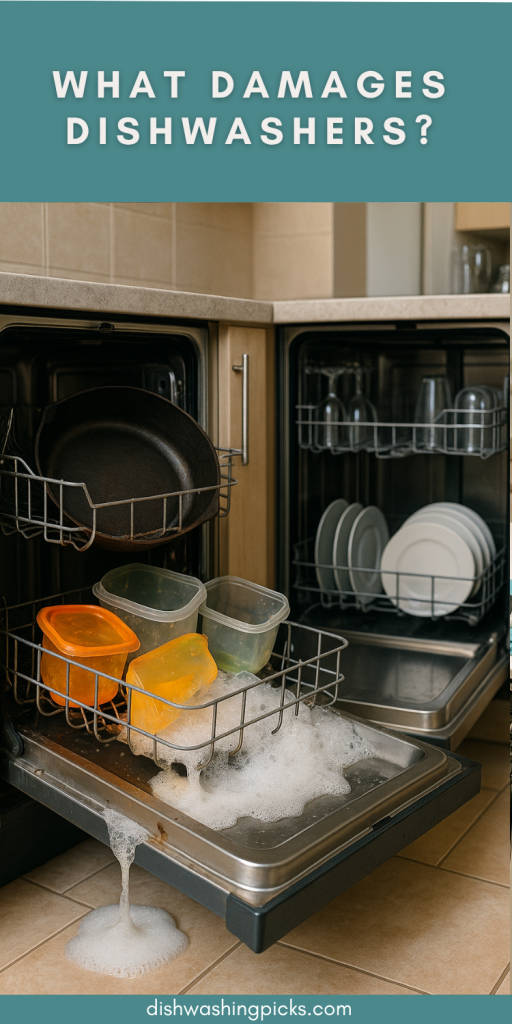
Wait… You’re Telling Me I Could Be Hurting My Dishwasher?
Let’s be real: dishwashers are like that one friend who does all the cleaning and doesn’t complain—until they do. And when they finally do complain? Oh, it’s not subtle. They rattle, smell funky, or just stop mid-cycle with a puddle of mystery water at the bottom.
So, what gives? Can our everyday habits actually damage dishwashers?
Short answer: yep.
Long answer: let’s unpack it together.
But don’t worry—I’m not here to guilt-trip you about your overpacked top rack or that sneaky spoon you never rinse. I’m here to show you why these little habits might be slowly wrecking your dishwasher and how you can dodge a pricey repair call.
So grab a cup of something warm, and let’s talk dishwasher sabotage (and how to quit it).
1. Overloading the Dishwasher (Yes, It Actually Matters)
We’ve all done it. You finish dinner, look at that mountain of dishes, and think, “Eh, I can squeeze that one plate in sideways.” But here’s the thing—dishwashers aren’t Tetris. They’re more like mini car washes. And if your plates are overlapping like a game of Jenga, guess what? The water jets can’t do their thing.
What gets damaged?
- The spray arms can get blocked or jammed.
- Your dishes don’t clean well, so you rewash them (wasting water + soap).
- It puts extra strain on the pump and motor.
Try thinking of it this way: if you were taking a shower, would you wear three layers of clothes? No? Then don’t block your dishes from getting that clean water love.
Quick Fix:
Give every dish some breathing room. That’s it. Easy.
2. Skipping the Rinse—Or Overdoing It
Ah, the eternal debate: to pre-rinse or not to pre-rinse?
Here’s the scoop: modern dishwashers need a bit of food residue to function properly.
Yep. Sounds weird, right? But detergent sensors rely on grime to judge how intense the wash cycle should be. If your plates are squeaky clean going in, the dishwasher gets lazy.
But on the flip side… big chunks of food? Bad news. They clog filters and mess with drainage.
What gets damaged?
- Filters and drains get blocked.
- Spray arms clog.
- Pump motors strain and burn out faster.
Rule of Thumb:
Scrape, don’t rinse. Let your machine do its job with just enough mess to work with.
3. Using the Wrong Detergent (Looking at You, Dish Soap Users)
Please, for the love of suds, never ever put regular dish soap in a dishwasher. You might think, “Soap is soap, right?” But nope. That bubbly overflow? Cute in sitcoms—nightmare in real life.
What gets damaged?
- Pumps and seals get gummed up.
- Sensors go haywire from foam overload.
- You might end up with bubbles pouring out like a scene from Friends.
What to do instead:
Stick with dishwasher-specific detergent. And if you’re using pods or tablets, store them in a dry place—moisture ruins them.
4. Not Cleaning the Filter (Out of Sight, Out of Mind?)
You know that weird smell when you open the dishwasher? Or that film left behind on your “clean” glasses? That might be your filter crying for help.
What gets damaged?
- Dirty water gets recirculated = gross dishes.
- Pump gets overworked.
- Could even lead to full-blown malfunctions.
Imagine this… you’re brushing your teeth with a dirty toothbrush every day. Sounds awful, right? Well, that’s your dishwasher when the filter’s full of gunk.
Fix it fast:
Clean the filter once a month. Takes five minutes. Saves hundreds in repairs.
5. Hard Water Build-Up (The Silent Dishwasher Killer)
You might not see it happening, but hard water deposits build up everywhere inside your dishwasher—on heating elements, spray arms, seals, and more.
What gets damaged?
- The heating element gets crusty.
- Water flow reduces = poor cleaning.
- Parts wear out faster.
How to fight back:
- Use dishwasher salt if your model supports it.
- Try a monthly rinse with white vinegar or use a commercial dishwasher cleaner.
- If you live in a hard water area? A water softener could save you a fortune long-term.
6. Slamming the Door or Letting It Drop
This one’s sneaky. That satisfying clunk when you shut the door? Too much force over time can mess with the latch, the hinges, or even the electronic control panel.
What gets damaged?
- Door springs, seals, and electronic boards.
- Misaligned doors = leaks galore.
Pro tip:
Close it gently. Treat it like the fancy appliance it is. No need to Hulk-smash.
7. Forgetting Regular Maintenance (AKA Dishwasher Self-Care)
Your dishwasher has feelings. Okay, not really—but it does have needs.
Skipping basic maintenance is like never taking your car in for an oil change. Eventually, something gives.
Simple monthly to-do list:
- Wipe the seals.
- Clean the spray arms.
- Check the filter.
- Run an empty hot cycle with vinegar or cleaner.
It’s not hard. Just make it part of your cleaning routine, and your dishwasher will repay you in spotless dishes for years.
Treat Your Dishwasher Like a Teammate, Not a Tank
Here’s the bottom line: dishwashers are durable—but not indestructible. A few bad habits, repeated often, can lead to expensive repairs or early replacements. But the good news? Most of the things that damage dishwashers are totally avoidable.
So next time you load it up, take a second to think: Is this helping—or hurting?
Because let’s be honest—we all want sparkling dishes and a dishwasher that actually lives to see its golden years.
